
The January Uprising was an insurrection principally in Russia's Kingdom of Poland that was aimed at the restoration of the Polish–Lithuanian Commonwealth. It began on 22 January 1863 and continued until the last insurgents were captured by the Russian forces in 1864.
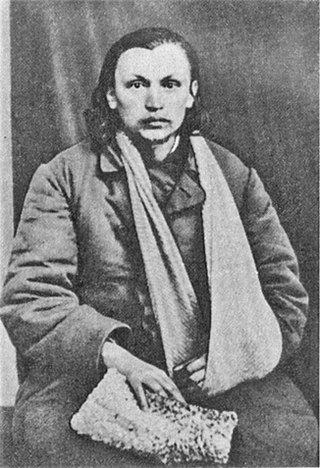
Stanisław Brzóska was a Polish priest, general, one of leaders of the Polish insurgency and the last partisan of the January Uprising. He commanded the Polish detachment in South Podlasie and northern Lesser Poland, defeating the Russians in many skirmishes. He was captured eventually in April 1865, sentenced to death by the Russians and hanged publicly in Sokołów Podlaski in the presence of a crowd of 10,000 people.

Złoczew is a town in Sieradz County, Łódź Voivodeship, Poland, with 3,340 inhabitants (2020). The city is 23 kilometres south of Sieradz and 23 kilometres north of Wieluń.

Ludwik Adam Mierosławski was a Polish general, writer, poet, historian and political activist. Mierosławski took part in the November Uprising of the 1830s, and after its failure he emigrated to France, where he taught Slavic history and military theory. Chosen as a commander for the Greater Poland Uprising of 1846, he was taken prisoner early but amnestied during the Spring of Nations. In 1848 and 1849 he fought for the insurgents in Baden and in the Electorate of the Palatinate. Afterwards he returned to France; he also had contacts with Italian activists like Giuseppe Garibaldi. He also took part in the January Uprising in the 1860s, as the first of four dictators of the Uprising.

Antanas Mackevičius was a Lithuanian Roman Catholic priest who was one of the leaders and initiators of the January Uprising in Lithuania.

Nowiny Brdowskie is a village in the administrative district of Gmina Babiak, within Koło County, Greater Poland Voivodeship, in west-central Poland. It lies approximately 6 kilometres (4 mi) east of Babiak, 4 km (2 mi) south-east of Brdów, 17 km (11 mi) north-east of Koło, and 125 km (78 mi) east of the regional capital Poznań.
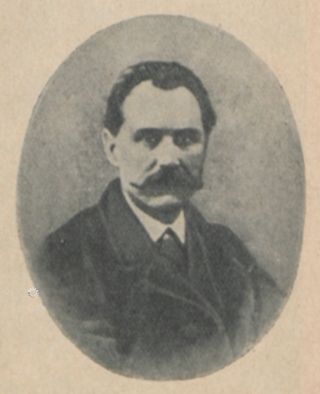
Bolesław Roman Dłuski, alias Jabłonowski - Polish physician, painter and military officer, leader of the January Uprising in Samogitia.
The Battle of Słupcza took place on February 8, 1863, near the village of Słupcza, Congress Poland, during the January Uprising. Up to 100 Polish insurgents commanded by Leon Frankowski and Antoni Zdanowicz clashed on that day with a unit of the Imperial Russian Army. The skirmish was won by the Russians.

The Battle of Krzywosądz was one of the battles of the January Uprising. It took place in the village of Krzywosądz, Congress Poland, on 19 February 1863, when a poorly armed party of 500 Polish insurgents, under Ludwik Mierosławski, clashed with a 1,000 strong unit of the Imperial Russian Army.
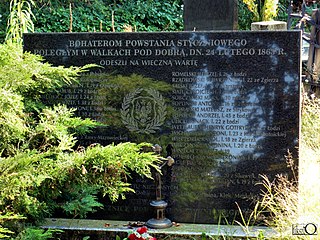
The Battle of Dobra took place on February 24, 1863 near the village of Dobra, Russian-controlled Congress Poland. It was one of many skirmishes of the January Uprising, the anti-Russian rebellion of Poles.
The First Battle of Nowa Wies took place on February 21, 1863, near the village of Nowa Wies, Russian-controlled Congress Poland. It was one of many skirmishes of the January Uprising, the anti-Russian rebellion of Poles. A group of some 600 Polish insurgents under Ludwik Mieroslawski clashed with 500 soldiers of the Imperial Russian Army. The battle ended in Russian victory.

The Battle of Mrzygłód took place on March 1, 1863 near the village of Mrzygłód, Russian-controlled Congress Poland. It was one of many skirmishes of the January Uprising, the anti-Russian rebellion of Poles. The battle resulted in Polish victory.
The Battle of Praszka, one of many skirmishes of the January Uprising, took place on April 11, 1863, near Praszka in southwestern corner of Russian-controlled Congress Poland. Polish forces under Jozef Oxinski clashed with troops of the Imperial Russian Army, commanded by Mayor Yakov Ogalin.
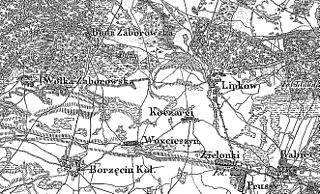
The Battle of Buda Zaborowska, one of many skirmishes of the January Uprising, took place on April 14, 1863, near the village of Buda Zaborowska in central part of Russian-controlled Congress Poland. Polish forces under Major Walery Remiszewski clashed with troops of the Imperial Russian Army. The battle resulted in Russian victory.
The Battle of Borowe Mlyny, one of many skirmishes of the January Uprising, took place on April 16, 1863, near the village of Borowe Mlyny in southeastern part of Russian-controlled Congress Poland. 300 Polish insurgents under Colonel Marcin Borelowski clashed with approximately 1,000 soldiers of the Imperial Russian Army.

The Battle of Pyzdry, one of many skirmishes of the January Uprising, took place on April 29, 1863, near the town of Pyzdry, which at that time belonged to Russian-controlled Congress Poland. 1,200 Polish insurgents under Edmund Taczanowski and Alojzy Oranowski clashed here with 1,500 soldiers of the Imperial Russian Army. The battle ended in Polish victory.
The Battle of Kobylanka, one of many skirmishes of the January Uprising, took place on May 1 and May 6, 1863, in the Kobylanka Forest, located near the village of Borowiec, which at that time belonged to Russian-controlled Congress Poland. A Polish insurgent party of some 800, under Antoni Jezioranski, clashed here with a 1000-strong unit of the Imperial Russian Army.

The Battle of Mełchów, one of many clashes of the January Uprising, took place on September 30, 1863, in the village of Mełchów, which at that time belonged to the Russian-controlled Congress Poland. A party of 800 Polish insurgents, commanded by Zygmunt Chmieleński, clashed with soldiers of the Imperial Russian Army. Russian losses were estimated at approximately 100 killed, while Polish losses totaled 70 killed and wounded.

The Battle of Rybnica, one of many clashes of the January Uprising, took place on October 20, 1863, near the village of Rybnica, which at that time belonged to Russian-controlled Congress Poland. A party of 650 Polish insurgents, commanded by Dionizy Czachowski, clashed with a 500-strong detachment of the Imperial Russian Army. The clash ended in rebel victory; Russian losses were estimated at app. 50–60 killed, while Poles lost 27 killed and 30 wounded.
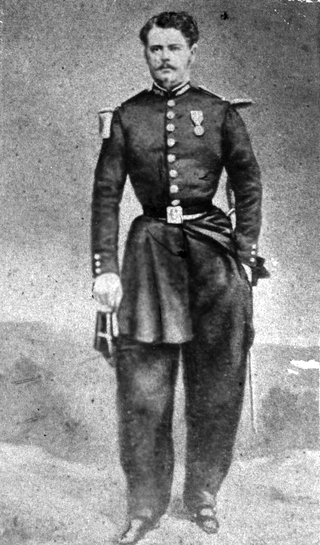
Leon Young de Blankenheim was a French Army soldier, who was promoted to the rank of colonel of Polish rebels during the January Uprising in the former Polish-Lithuanian Commonwealth against the Russian Empire on April 26, 1863.














